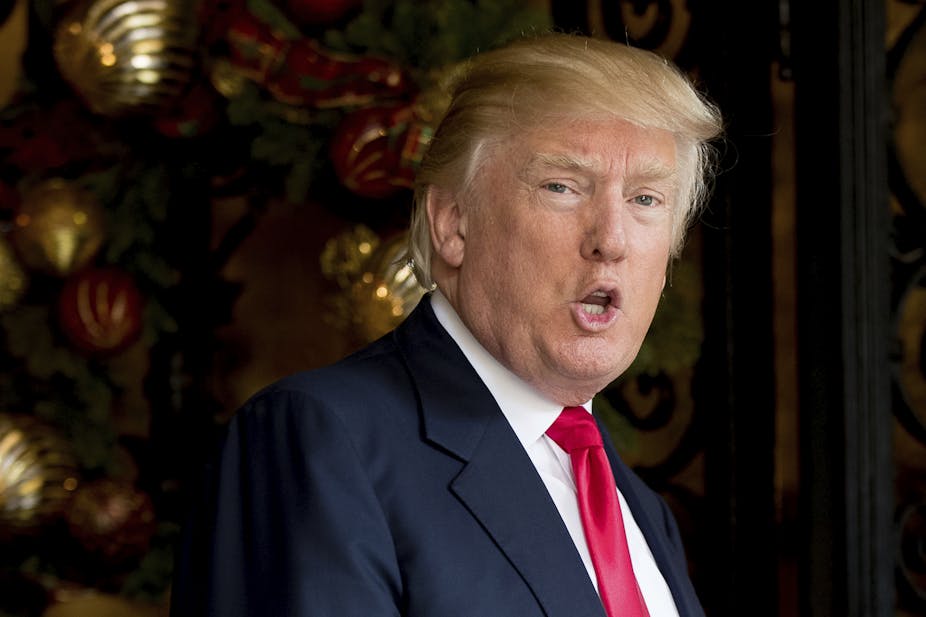Last week, President Trump retweeted to his nearly 44 million followers a series of videos purporting to show Muslims assaulting people and destroying Christian statues. These videos, originally shared by an extremist anti-Muslim group in the U.K., were shown to be inaccurate and misleading.
In response to widespread news coverage of the tweets, White House Press Secretary Sarah Huckabee Sanders claimed that the president was merely calling needed attention to the threat posed by Muslims and radical Islam, noting that “The threat is real.”
Many questioned how the president’s actions might affect American Muslims, who the FBI reports are already facing unprecedented levels of religiously motivated hate crimes. The State Department even worried that there could be violent reactions at American embassies around the world and an escalation of religious conflict.
Are such concerns warranted? Our research suggests yes.
Religious threat in the United States
We study the psychological consequences experienced by individuals who are the targets of prejudice and discrimination. In a recent study, we conducted a survey to investigate experiences of “religious threat” among nearly 1,000 Muslims, Jews, Protestants and Catholics across the United States. By religious threat, we mean the feeling that one is targeted, stigmatized or threatened because of one’s religion.

We were interested in comparing religious threat experiences between religious groups and between less religious and more religious individuals.
Predictably, Muslims reported feeling the most religious threat. In our sample, 52 percent of Muslims reported that it was “somewhat true” to “very true” that they felt targeted because of their religion. One Muslim participant in our study noted that people think, “I must be a terrorist.” Jews reported feeling the second most amount of threat.
In addition, we found that the more religious people were – that is, the more they considered religion to be important in their lives – the more religious threat they reported. This was especially true among Protestants. In fact, among people who were more religious, Protestants felt just as threatened as Muslims and Jews.
This last finding seems consistent with the belief shared among many religious Protestants that religious values and traditions are under attack in American society.
President Trump may be tapping into this increased anxiety.
Reaction to discrimination
A noteworthy aspect of our study is that we found that feeling targeted because of one’s religion may trigger defensive psychological reactions that can lead people to feel socially isolated and, perhaps ironically, fan the flames of intolerance.
We found that people who experienced more religious threat in our sample were less likely to feel that they belonged in the United States in general, or in their workplace or school. We found this to be true no matter what religion respondents belonged to.
This feeling of social isolation or ostracism can be interpreted by the brain in the same way as physical pain, suggesting the damaging potential of religious threat. Decades of research in social psychology also highlight how negative stereotypes, prejudice and discrimination can undermine mental and physical health.
We also found that in response to religious threats, people tend to discriminate against others. In our sample, people who experienced more religious threat also expressed more negative attitudes toward members of other religions.
Religious threat experiences may help to explain rising levels of religious intolerance, evidenced by increased hate crimes against religious minorities, calls for a ban on Muslim immigration and chants of “Jews will not replace us” at Charlottesville, Virginia’s “Unite the Right” rally.
Why prejudice can lead to more prejudice
Why would people who feel threatened respond by ratcheting up conflict?
Research in social psychology suggests that people draw a sense of self-worth from various social identities like race and religion. When the groups to which people belong are discriminated against, people feel threatened. This, in turn, could lead some to discriminate back. Indeed, responses may vary, depending, among other things, on a group’s social power. In our sample, for example, Muslims were least likely to show such a retaliatory response.
However, research by others – also conducted with Muslims – shows how the social isolation and perceived dehumanization that can accompany religious threat could actually contribute to religious radicalization and increase politically motivated violence.
In other words, when people perceive religious threat, it can have harmful societal consequences that can build over time.

The president’s tweets
Our research may also shed light on why President Trump shared anti-Muslim videos in the first place. As the White House press secretary said, his decision was a direct response to a perceived threat posed by Muslims. However, religious threat is not a one-way street.
Attacking Muslims is not likely to stop religious conflict, but instead increase religious tension by fostering a spiraling tit-for-tat of religious threat and prejudice that increases in severity over time. This type of cyclical process has long been documented by scholars. If people who feel discriminated against because of their religion retaliate by discriminating against other religions, religious intolerance is only going to snowball.
If President Trump really wants to stop religious violence, social psychology suggests he should refrain from it himself.

